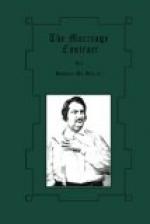No descriptive language can express the confusion and shock which the words, “break off,” introduced into the conversation. It is enough to say that these four apparently well-bred persons all talked at once.
“In Spain people marry in the Spanish fashion, or as they please; but in France they marry according to French law, sensibly, and as best they can,” said Mathias.
“Ah, madame,” cried Paul, coming out of his stupefaction, “you mistake my feelings.”
“This is not a matter of feeling,” said the old notary, trying to stop his client from concessions. “We are concerned now with the interests and welfare of three generations. Have we wasted the missing millions? We are simply endeavoring to solve difficulties of which we are wholly guiltless.”
“Marry us, and don’t haggle,” said Solonet.
“Haggle! do you call it haggling to defend the interests of father and mother and children?” said Mathias.
“Yes,” said Paul, continuing his remarks to Madame Evangelista, “I deplore the extravagance of my youth, which does not permit me to stop this discussion, as you deplore your ignorance of business and your involuntary wastefulness. God is my witness that I am not thinking, at this moment, of myself. A simple life at Lanstrac does not alarm me; but how can I ask Mademoiselle Natalie to renounce her tastes, her habits? Her very existence would be changed.”
“Where did Evangelista get his millions?” said the widow.
“Monsieur Evangelista was in business,” replied the old notary; “he played in the great game of commerce; he despatched ships and made enormous sums; we are simply a landowner, whose capital is invested, whose income is fixed.”
“There is still a way to harmonize all interests,” said Solonet, uttering this sentence in a high falsetto tone, which silenced the other three and drew their eyes and their attention upon himself.
This young man was not unlike a skilful coachman who holds the reins of four horses, and amuses himself by first exciting his animals and then subduing them. He had let loose these passions, and then, in turn, he calmed them, making Paul, whose life and happiness were in the balance, sweat in his harness, as well as his own client, who could not clearly see her way through this involved discussion.
“Madame Evangelista,” he continued, after a slight pause, “can resign her investment in the Five-per-cents at once, and she can sell this house. I can get three hundred thousand francs for it by cutting the land into small lots. Out of that sum she can give you one hundred and fifty thousand francs. In this way she pays down nine hundred thousand of her daughter’s patrimony, immediately. That, to be sure, is not all that she owes her daughter, but where will you find, in France, a better dowry?”
“Very good,” said Maitre Mathias; “but what, then, becomes of madame?”
At this question, which appeared to imply consent, Solonet said, softly, to himself, “Well done, old fox! I’ve caught you!”




